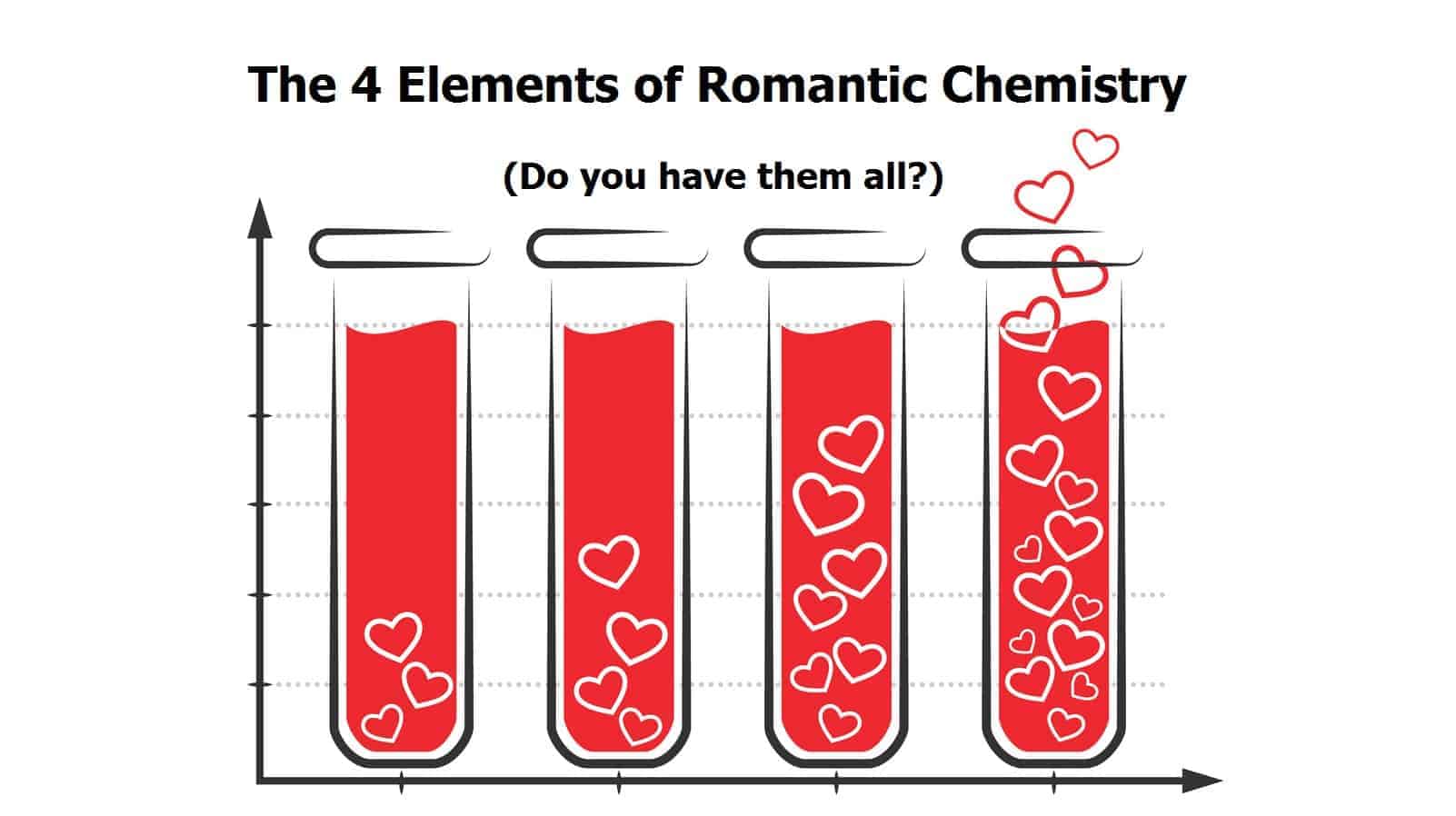Chemistry is what we say that two people have that creates a strong romantic connection between them, and there are 4 elements of chemistry that indicate the strength of your bond. You and your partner might have zero, some, or all four of these elements of romantic chemistry when you are together.
Romantic chemistry is more than just a sexual attraction to your partner, although things may have certainly started out that way when you first saw each other. Sexual chemistry is not enough to build a relationship on, but if you and your mate have all 4 of the elements of romantic chemistry, it’s a good sign that you have a bond that will last.
4 Elements That Create Romantic Chemistry. Do You Have Them All?
What we think and say that we want in a romantic partner is different from what we actually end up choosing. This has been shown in speed dating study conducted by Northwestern University where participants were asked what they were looking for prior to the dating sessions on levels of physical attractiveness and income potential. However, the actual preferences for partners after the speed-dating event showed that people were not able to identify why they chose certain potential romantic partners over others.
1. Physical romantic chemistry
When you and your partner can’t keep your hands off of each other, that’s physical romantic chemistry. You want to be close, and you spend a lot of intimate time together. Looking into each others eyes, you know that your partner desires you and enjoys the physical closeness that you share.
It is difficult to have excellent physical chemistry without also having emotional feelings of love or caring for your partner as well. Physical chemistry may seem more sexual, but it is also a sign of emotional romantic chemistry. Trust for each other is important to physical chemistry.
2. Emotional romantic chemistry
Your partner feels supported emotionally and so do you when you have emotional romantic chemistry. You make sure that you do the emotional work in your relationship to build positive emotional feelings in each other. You also help manage negative emotions when you recognize them in your partner by asking them to talk with you about their feelings.
When partners can sense each others’ emotional states, it’s a good sign that they have this element of romantic chemistry. Researchers who looked at romantic relationships and emotional intelligence say ‘Individuals who have better understanding of others’ emotions in conjunction with insight into their own emotions may enter relationships with more compatible partners. Emotional competencies may make it more likely that individuals with these competencies establish pleasant and mutually satisfying relationships because of their ability to understand and manage their own emotions and their ability to perceive, understand, and help regulate their relationship partner’s emotions.’
The research goes on to say that lacking emotional intelligence is not a death sentence for couples because they can learn this skill. The study suggests, ‘If emotional intelligence contributes to better interactions between partners, training couples in emotional skills may help to improve relationships. Recent studies have shown that it is possible to increase state emotional intelligence with training.’
3. Spiritual romantic chemistry
A belief system doesn’t have to be religious based. Some couples find a romantic chemistry through their similar beliefs in environmentalism, vegetarian diet, reverence for life, or other strong beliefs that do not necessarily rely on religious views as their basis. On the other hand, some couples have very deeply held traditional religious views and would want their partner to convert to have the same beliefs as they do.
Related article: Why You Will Marry The Right Person?
Spiritual romantic chemistry can be maintained even when partners are of different faiths. A study in the Journal Marriage and the Family looked at interfaith marriages among Catholics and found that interfaith households where only one partner is Catholic are able to maintain a strong religious commitment and do not become more secularized when they marry someone from a Protestant faith.
4. Intellectual romantic chemistry
Compatibility with your partner in your intelligence is the final element that creates romantic chemistry. However, it is entirely likely that you and your partner have different levels of education or levels of book learning intelligence, but you may be compatible in other ways.
Related article: 6 Things That Happen When You Fall In Love
For example, being able to openly discuss ideas, challenge each others’ beliefs, encourage learning by your partner, or share what you have learned means that you have created a good level of intellectual romantic chemistry in your relationship. Remember that there are other types of intelligence too, for example, a farmer has a great deal more knowledge about plants than you might and a mechanic knows a great deal more about car repairs than you might want to know.














 Community
Community

